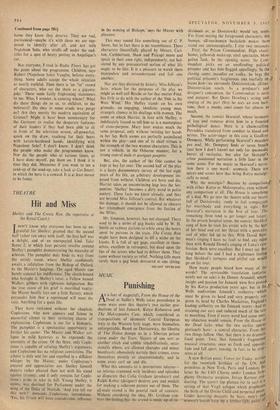THEATRE
Hit and Miss
T DON'T know why everyone has been so un-
grateful for Shelley; granted that the second half rather ran away with itself, the first half was a delight, and of an unexpected kind. Take Scene 2, in which four persons revolve around Shelley's pamphlet demonstrating the necessity of atheism. The pamphlet duly finds its way from the untidy room, where Shelley confidently awaits a refutation from the Bishop of Oxford, to the Master's lodgings. The aged Master can barely conceal his indifference. The sleuth-hound who brought it, Shelley's tutor, a Fellow named Walker, gibbers with righteous indignation. But the true cause of his grief is mortified vanity; the Master hastily lays out a little flattery, which persuades him that a reprimand will meet the case. Anything for a quiet life.
They have reckoned without the chaplain, Coplestone, who now appears and listens in masterful silence to their twittering chorus of explanation. Coplestone is out for a bishopric. The pamphlet is a spectacular opportunity to further his career. The Master and Walker col- lapse in mild hysterics as he expounds the enormity of the crime. Of the three, only Conic- stone is capable of refuting Shelley's arguments, and Coplestone has no religious convictions. The atheist is duly sent for and expelled in a diffident whisper by the Master, under Coplestone's amused and appreciative eye. Shelley himself departs rather pleased than not with his stand against tyranny; and it only remains for Cople- stone's pride to take its fall. Young Shelley, it seems, was destined for Parliament under the wing of the Duke of Norfolk. 'And you tell me this now?' demands Coplestone, incredulous. 'Yes, his Grace will have considerable influence in the naming of Bishops,' says the Master with pleasure.
This may sound like something out of C. P. Snow, but in fact there is no resemblance. These characters (beautifully played by Messrs. Carl- ton, Cuthbertson, Shaw and Pickup) move and speak in their own right, independently, not bol- stered by any preconceived notion of what life ought to be like. It is a pleasure to watch them manipulate and misunderstand and foil one another.
Nor are they dictated by history. Miss Jellicoe's hero, whom for the purposes of the play we might as well call Bysshe or for that matter Fred, has little to do with the author of the 'Ode to the West Wind.' Her Shelley stands on his own grounds, an engaging, idealistic young man, strangely clumsy in his dealings with women. The scene in which Harriet, in love with Shelley, is indelicately forced to tell him so is a masterpiece of cross-purpose. Mary later makes much the same proposal, only without twisting her hands in her lap. Both scenes are perfectly assimilated within the play—and one of its chief virtues is the strength of the two women characters. This is not a vehicle, in the Osborne manner, for a strong central male et quelques poupees.
But, alas, the author of the Ode cannot be kept at bay for ever. The second half of the play is a hasty documentary survey of the last eight years of his life, an arbitrary development im- posed from without. Children are born and die. Harriet takes an unconvincing leap into the Ser- pentine. 'Shelley' becomes a dirty word in polite society. These facts we knew already, and they are beyond Miss Jellicoe's control. But whatever ' the damage, it should not be allowed to obscure her triumphant emergence from the fustian of the 'fifties.
Mr. Simpson, however, has not changed. There used to be a series of gag books sold by W. H. Smith on railway stations to while away the hours spent by patrons in the train. The Cresta Run might have been designed to fill a niche on the kiosks. It is full of spy gags, excellent in them- selves, excellent in retrospect, but dead upon the lips of the actors who had to deliver them. They came without variety or relief. Nothing kills more surely than a gag book devoured at one sitting.
HILARY SPURLING






































 Previous page
Previous page